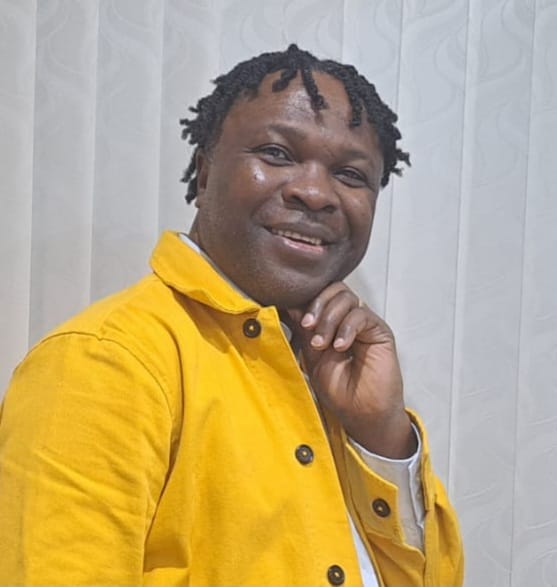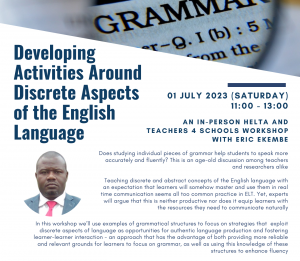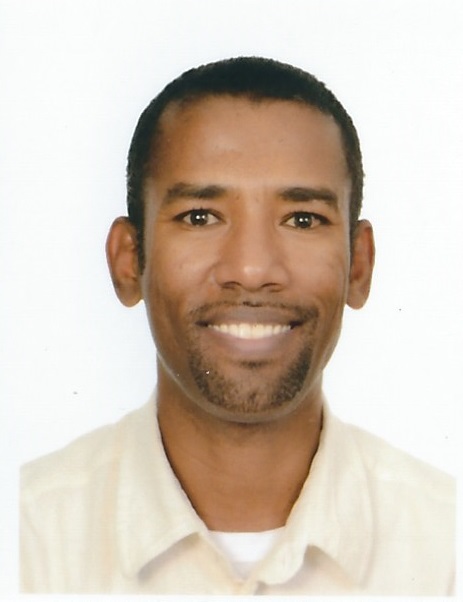Teachers 4 Schools Events
Reading to write, writing for what? – A workshop with Harry Kuchah Kuchah
Where: Exams Centres Nord (Eulenkamp 46, 22049 Hamburg)
When: 1430, 26 January 2024
Register: contact@t4s.info (by 19 January)
Reading and writing have traditionally been described as receptive and productive skills respectively, but this distinction tends to blur the relationship between both skills. As a result many teachers tend to teach both as separate skills and in different lessons, depriving students of the opportunity to build meaningful connections between different aspects of language. In the first part of this hands-on workshop, I will, together with participants explore different ways in which both skills can be integrated in an EFL classroom. Particularly I will show how reading supports writing and vice versa using examples from my own practice with young learners and teenagers. In the second part of the workshop, participants will be invited to assess a piece of writing with the view of answering the question: what do students write and what do teachers read? Then I will draw from my research into the teaching and assessment of writing in an EFL context in Africa to explore ways in which the assessment of writing could be better aligned with the processes of learning how to write in order to minimise possible disconnections between the teaching and assessment of writing in schools.

About Harry: Harry Kuchah Kuchah is Associate Professor of Languages, Social Justice, and Education at the School of Education, University of Birmingham. He has extensive experience of training and mentoring teachers and teacher researchers across Africa and has recently led a teacher research mentoring programme for the British Council in China. His research interests include language teacher education, context appropriate pedagogies, teaching languages to young learners and English- medium education in multilingual contexts. He is co-editor of International Perspectives on Teaching English in Difficult Circumstances (Palgrave Macmillan 2018), Ethical and methodological issues in researching young language learners in school contexts (Multilingual Matters 2021) and Teacher
Research in Africa: Voices from the Africa ELTA Mentoring Project (IATEFL 2022).
More…
Developing activities around discrete aspects of the English language – A talk by Eric Ekembe
Does studying individual pieces of grammar help students to speak more accurately and fluently? This is an age-old discussion among teachers and researchers alike.
Teaching discrete and abstract concepts of the English language with an expectation that learners will somehow master and use them in real time communication seems all too common practice in ELT. Yet, experts will argue that this is neither productive nor does it
equip learners with the resources they need to communicate naturally.
In this workshop we’ll use examples of grammatical structures to focus on strategies that exploit discrete aspects of language as opportunities for authentic language production and fostering learner-learner interaction – an approach that has the advantage of both providing more reliable and relevant grounds for learners to focus on grammar, as well as using this knowledge of these structures to enhance fluency.

About Eric: Eric Ekembe holds a PhD in Applied Linguistics from the University of Yaounde 1, Cameroon and is senior lecturer at the Higher Teacher Training College in Yaounde. He runs the CAMELTA Research Group and is the outreach coordinator of the IATEFL ReSIG. He is a TransformELT Consultant and a member of the steering committee of the International Festival of Teacher Research.
At the recent 2023 IATEFL Conference, he presented and was a panelist on the ReSIG Open day. His research interest is postcolonial discourse and decoloniality in ELT.
Eric has published research articles in international journals and is co-editor of Interdisciplinarity in the 21st Century Global Dispensation: Research in Language, Literature, & Education in Africa (Nova Pub, USA) and lead editor of Interface between English Language Education Policies and Practice: Examples from Various Contexts (Palgrave Mcmillan UK).
An Evening with Teachers 4 Schools with guest Aymen Elsheikh (08 February 2019)
What Can the Sudanese Context Teach Us about African Future Teachers’ Knowledge and Identity Construction? – A talk by Aymen Elsheikh How do future teachers in Africa develop their knowledge and identity about teaching the English language? In order to maximize students’ learning opportunities, it is important to investigate how their teachers learn about and conceptualize both teaching and the subject matter. In this presentation, I draw on ethnographic data collected from future teachers of English in Sudan to show the process of teacher knowledge and identity construction. The participants in the study drew from different sources of knowledge, such as their personal knowledge and knowledge gained in the formal training program. They also saw and represented themselves in particular ways, such as authority figures, through their classroom practices. I conclude the presentation by arguing that the findings resonate with many African contexts and understanding the experiences of the future teachers contributes to their proper preparation as well as enhances the students’ learning potential.
About Aymen: Dr. Aymen Elsheikh, Instructional Assistant Professor at Texas A&M University at Qatar, received a PhD in literacy, culture, and language education from Indiana University, Bloomington. He has over 10 years of teaching experience in different countries including Sudan, Oman, USA, Qatar, and the UAE. Dr. Elsheikh’s research interests revolve around translanguaging, where multilingual speakers use their languages for communication’, teacher knowledge and identity, teaching English as an international/glocal language, language teacher associations, among others. He has published and given numerous conference presentations on these topics. He currently serves as Africa TESOL’s Vice President, and he is an incoming member of the Editorial Advisory Board of TESOL Journal (2019 – 2021) and TESOL Nominating Committee.
followed by
Panel Discussion with Aymen Elsheikh, Andreas Grundtvig (T4S Chair), Wilton Mills (T4S Treasurer) and Rebecca Garron (T4S Joint Liaison Officer)